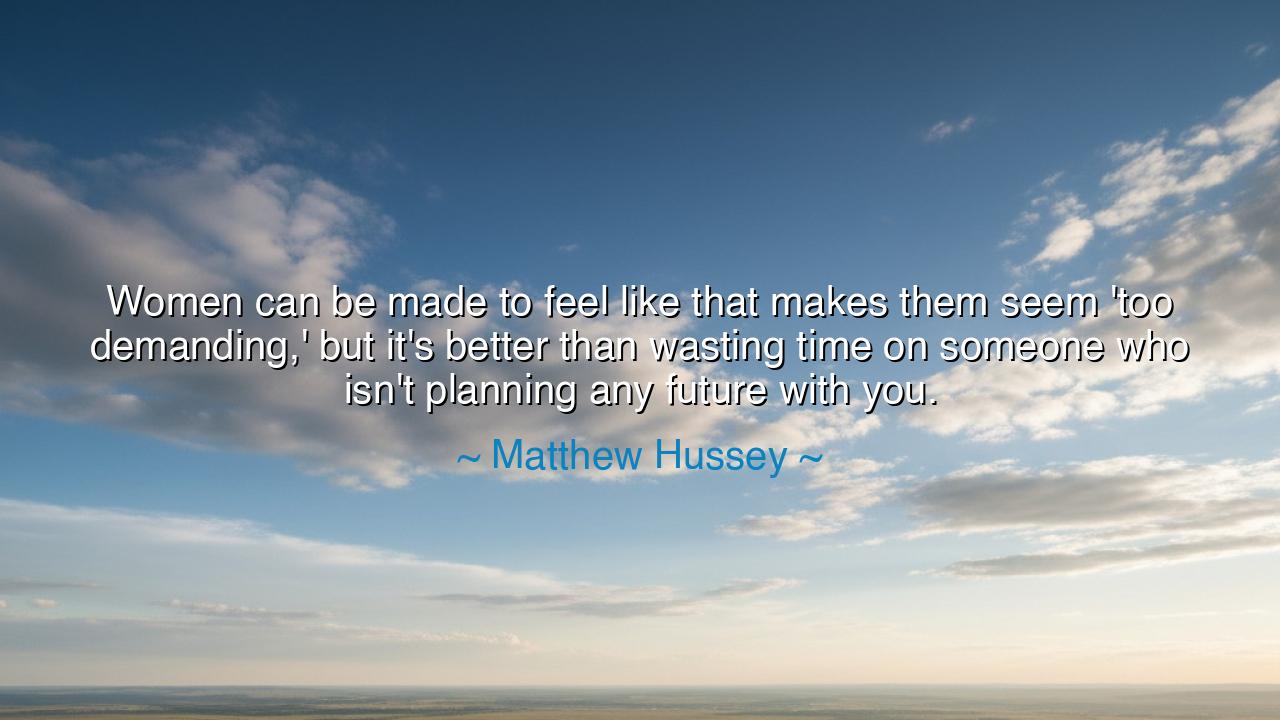
Women can be made to feel like that makes them seem 'too
Women can be made to feel like that makes them seem 'too demanding,' but it's better than wasting time on someone who isn't planning any future with you.






In the long history of human relationships, there has always been a delicate balance between desire, expectation, and respect. Matthew Hussey speaks to this tension when he says, "Women can be made to feel like that makes them seem 'too demanding,' but it's better than wasting time on someone who isn't planning any future with you." These words offer a profound piece of wisdom that transcends the dynamics of romantic relationships and touches upon the fundamental importance of self-respect and self-worth. Hussey’s insight encourages individuals, particularly women, to value themselves enough to demand relationships that offer mutual respect, growth, and a shared vision of the future, rather than settling for a transient connection.
In the ancient world, the concept of value in relationships was often defined by what one brought to the union, both emotionally and materially. The Greeks held the idea of eudaimonia, or human flourishing, as central to life’s purpose. Relationships, therefore, were meant to serve as a means of supporting each other’s growth and well-being. However, the great philosophers also understood that one could not flourish in a relationship where one partner was unwilling to offer the same commitment. Aristotle believed that the foundation of a good marriage was mutual respect and a shared sense of purpose. In this way, Hussey’s call for women to avoid wasting time on someone who does not share their vision for the future resonates deeply with the ancient wisdom of ensuring relationships are built on equality and mutual commitment.
Similarly, in Rome, the philosophers and statesmen recognized that personal integrity and self-worth were crucial in choosing a partner. Cicero, in his writings, often discussed the idea of virtue in relationships, not only between husband and wife but between all human beings. For Cicero, the highest virtue was not subjugating oneself to others’ expectations but standing firm in one’s integrity. He believed that a true partnership was one in which both individuals could bring their whole selves to the union without fear of being diminished. Hussey’s message, then, is aligned with this ancient understanding: it is far better to demand a future filled with shared goals than to remain in a relationship where one partner’s desires are consistently ignored or minimized.
In medieval Europe, where marriages were often seen as arranged for reasons of family alliances and wealth, the notion of personal fulfillment in love was often overlooked. However, the idea of romantic love began to shift, especially with the rise of courtly love in the 12th century. Knights and ladies of the court sought relationships based on mutual respect, and while the social structures still favored marriage for pragmatic reasons, the ideal of love began to transform. The concept that one should expect and demand more from a relationship—such as respect and future planning—was embedded in this evolving vision. Hussey’s call is an echo of this medieval shift: a reminder that love is not just about emotional fulfillment, but about creating a future together, built on shared goals and mutual commitment.
Hussey’s words also speak to a modern truth—the value of self-respect and the importance of not allowing others to dictate your worth or place in a relationship. In recent history, the feminist movement has made great strides in encouraging women to seek partnerships where equality, respect, and future planning are central. The 20th century brought forth the realization that women, too, deserve relationships where their voices are heard and their ambitions supported. Just as Susan B. Anthony and Elizabeth Cady Stanton fought for women’s rights in the political sphere, so too does Hussey encourage women to demand equality in the realm of love and partnership. Settling for less than one deserves is a disservice to oneself and undermines the very purpose of being in a relationship: to grow together and support one another in mutual flourishing.
The lesson from Hussey’s words is clear: it is better to demand respect, commitment, and future planning than to remain in a relationship where those needs are not met. Just as Socrates urged his students to examine their lives and question their choices, we, too, should examine the relationships we enter into. Are they founded on mutual respect and shared visions, or do they leave us adrift in uncertainty and unmet needs? Life is too precious to waste on those who do not see our worth or are not invested in a shared future.
In practical terms, the message here is one of empowerment. We must be bold enough to ask for what we need and not be afraid to walk away when those needs are not met. This requires a clear sense of self and the ability to recognize that our value is not determined by others, but by our own beliefs and the respect we demand from others. Hussey reminds us that relationships, at their best, should be a partnership in the truest sense—a union that moves forward, hand in hand, towards a shared future. In this, we find the strength to build a life with someone who truly values us, not as a fleeting presence, but as a companion in life’s journey.
As the ancients taught, true love and partnership are rooted in respect, equality, and shared purpose. So let us move forward, not in fear or compromise, but in strength and clarity, demanding relationships that honor our worth, our goals, and our vision for the future. In this way, we ensure that we do not waste our time, but instead build a legacy of mutual respect and love that grows stronger with each passing day.






AAdministratorAdministrator
Welcome, honored guests. Please leave a comment, we will respond soon